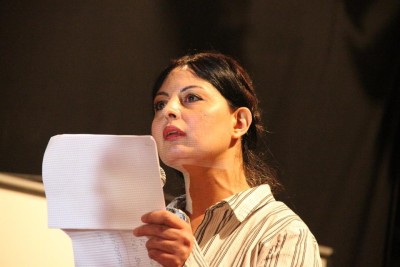 MM: Good day Bissan Ahmed. In the catalogue of the 2010 Al Mutanabbi Poetry Festival organised by the Mesopotamian Cultural Institute Baghdad-Babylon you are presented as Bissan Abu Khaled:
MM: Good day Bissan Ahmed. In the catalogue of the 2010 Al Mutanabbi Poetry Festival organised by the Mesopotamian Cultural Institute Baghdad-Babylon you are presented as Bissan Abu Khaled:
 Born in 1969 in Damaskus. Studies of Medicine in Damaskus. She worked in pathology in Brussels, later at the University of Liege, Belgium. At present she works at the Portland University, USA. She participated in the “Spring of Poets”-Festival organized by the Arab World Institute Paris in 2004, reading the poem “Lamentations of Madness”, in which she points out the expulsion of the Palestinian from space and time. Several publications in Arabic/French, “Sigh Farewell” and “Mirrors Time”. Her first volume of poetry was “Cross to Wait Until” (1997-98).
Born in 1969 in Damaskus. Studies of Medicine in Damaskus. She worked in pathology in Brussels, later at the University of Liege, Belgium. At present she works at the Portland University, USA. She participated in the “Spring of Poets”-Festival organized by the Arab World Institute Paris in 2004, reading the poem “Lamentations of Madness”, in which she points out the expulsion of the Palestinian from space and time. Several publications in Arabic/French, “Sigh Farewell” and “Mirrors Time”. Her first volume of poetry was “Cross to Wait Until” (1997-98).
MM: You have an impressive vitae excelling in both medicine and literature. How do you combine both and is there a deeper connection between the two for you?
BA: The human goal of both is the only connection, however, you need a very good balance to keep both in one life.
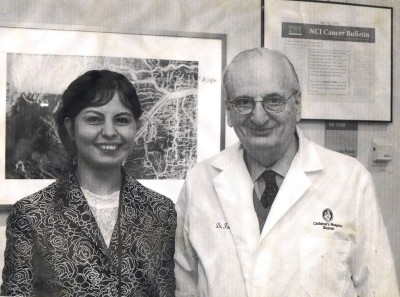 I think I selected scientific research in oncology as a track since it is also kind of creative scientific art and you need the faith of a Don Quixote inside to keep you doing battle against cancer.
I think I selected scientific research in oncology as a track since it is also kind of creative scientific art and you need the faith of a Don Quixote inside to keep you doing battle against cancer.
MM: You have also navigated several cultures. Some would say, you are a true citizen of today's world. Are you still feeling "at home" in some physical or spiritual place?
BA: Yes, I feel home in Belgium, but indeed I moved from Asia to Europe to America and back here, it is a very rich experience and I am really the citizen of the world. You can see the people prisoners in artificial borders, but as a Palestinian you feel somehow the historical pressure of this immigration.
So, I was not surprised that the title of Edward Saeed’s book "Out of Place": Although he is a star of the world, the title reflects that he was somehow out of his original country Palestine. Nevertheless, despite the tragic side about the political crises that this origin evokes, I think we are finding an interesting global identity. It is much richer than being from all around the world or being pushed to be Israeli - just one single created identity!
MM: You have always engaged for the wellbeing of people and social justice. What do you see as your major achievement? and what was the most difficult obstacle you encountered so far?
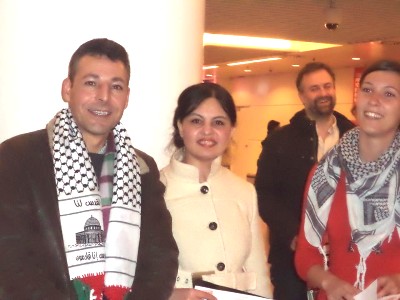 BA: Yes indeed we struggled for social justice. I was particularly happy that I met Dr Nawal El Aladawi in Belgium. She is the first feminist in the Middle East. Her organisation in Egypt was closed and she was put on the black list of Islamic movements. So we established with her the Arab Women’s Solidarity Association-Belgium (AWSA). I am proud that we met that challenge. I was also one of few, who established the Palestinian community in Belgium.
BA: Yes indeed we struggled for social justice. I was particularly happy that I met Dr Nawal El Aladawi in Belgium. She is the first feminist in the Middle East. Her organisation in Egypt was closed and she was put on the black list of Islamic movements. So we established with her the Arab Women’s Solidarity Association-Belgium (AWSA). I am proud that we met that challenge. I was also one of few, who established the Palestinian community in Belgium.
The most disappointing obstacle I ever faced was when we as a Palestinian Community tried to judge Mr Ariel Sharon in Belgium, based on his war crimes in 1982 . Under the pressure of Israel and America, Belgium has changed the law to close this case. What concerns me the most is that we have built it based on a successful trial for war crimes in Congo. Belgium had a very supportive role in its justice system in that case from the perspective of Congo as an ex-colony. Conversely, Israel was considerd by this law as an independent democratic country.
MM: You have mostly lived in cities between 100 and 200 km away from the coastline, where the sea influences the climate, trade and much more. That may not give an urbanite a direct sense of the ocean. What do you feel about your connection to the sea?
BA: The sea is my inspiration for poetry, the grave yard of all my sorrows. I lived next to it in Boston. In Belgium, Portland and Syria I regularly went there, even on rainy days. It is in a place near the sea, where I can read and write.
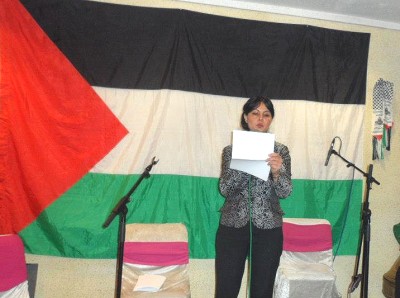 Let me share one of such poems with you as inspiration of love connecting Juliet with our famous lovers Laila and Qays. Qays was crazy, searching for her since the family prohibited this marriage (click here for some more explanations). It is a call to keep on looking for love whatever is the obstacle, the beloved one could be just behind the Ocean.
Let me share one of such poems with you as inspiration of love connecting Juliet with our famous lovers Laila and Qays. Qays was crazy, searching for her since the family prohibited this marriage (click here for some more explanations). It is a call to keep on looking for love whatever is the obstacle, the beloved one could be just behind the Ocean.
My Poem (original in Arabic, kindly translated by Noor Nader Al Abed and Francesca Bell):
On Looking for Laila in Juliet
Your other shore flies for the unknown
and, like a sail stripped from my ship, leaves a shining wound,
and the sea will flood in to drown my cargo, my song.
So I will flit to Juliet’s windows
and send Qays west, to the ancient times, to look for the lost Laila in Juliet.
He is reborn in those poems of his,
they will make him a name strong as a knight’s blade.
Oh, Qays, your wailing brings a leaping delight that flourishes for ages after you in the desert,
and you know that the desert lulls a nostalgia for death’s lust so that its parched kiss
stays safe.
Passion chews you, driving you to wander the sands looking for Laila
forgetting your life’s orbits as if time were smoke.
Oh, tell me a suitor will come to revive a lovers’ spring in the world, to revive Laila
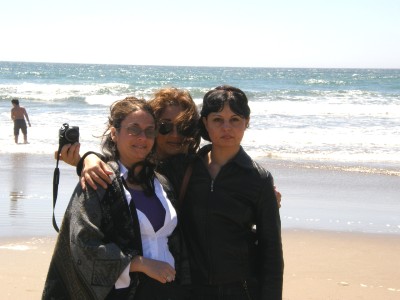 in this time of desolation and desert.
in this time of desolation and desert.
MM: For this year's World Ocean Day, we invite young people to participate in the contest for the Mundus maris Awards 2015 by sending in a short story about the ocean of their dreams. What is your dream for the ocean and what do you want to tell the participants?
BA: My dream for the Ocean is that it remains the bridge which connects all citizens of this world, not only by ships. I want to tell people about the small film: we were tought that you can write a letter and put it in a bottle and throw it into the Ocean. It reflects that you have a great faith that someone on the other side of this world will be certainly receiving your words. Without this faith we will never write travel stories or even simply talk to one another.
MM: Thank you for sharing your views.
BA: My pleasure and all the best for reaching many youth for celebrating World Oceans Day.
Pictures kindly provided by Bissan Ahmed.








